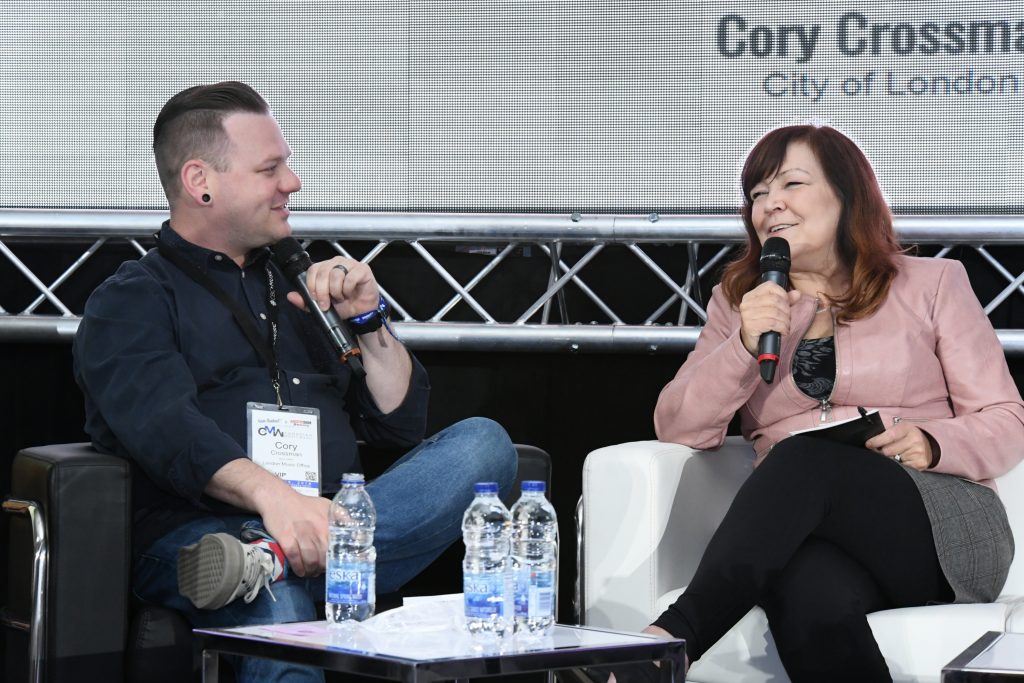On Saturday May 12th, Music Canada held its third annual international Music Cities summit The Mastering of a Music City during Canadian Music Week. City professionals, policy-makers, industry executives, and music community members all gathered to discuss topics related to the value of music, its economic impact, and its relationship to innovative city planning and creative entrepreneurship. Click here to view more recaps from the summit.
The last panel of the day was Making Space in the Public Realm: How Public Spaces Can Contribute to Scenes and Strategies. It examined how cities are utilizing publicly-owned buildings to create partnerships and develop initiatives with the music community. Business and community leaders from Denver, Seattle, Vancouver and Montreal discussed how public facilities can work in collaboration with their local music scene, and touched on issues like how to avoid competition with the private sector.
The panel was moderated by Farzaneh Hemmasi, Assistant Professor of Music & Ethnomusicology at the University of Toronto. Panelists included: Catherine Planet, Artist & Founder of La Chasse-Balcon; Dawn Ibey, Vancouver Public Library; Ismael Guerrero, Executive Director of the Denver Housing Authority, and; Tom Mara, Executive Director, KEXP.
Final panel of 2018 #MusicCities Summit, “Making Space in the Public Realm: How Public Spaces Can Contribute to Scenes and Strategies,” ft. reps from Montreal, Vancouver, Toronto, Denver, & Seattle. #CMW2018 pic.twitter.com/ajTAhFgNJn
— Music Canada (@Music_Canada) May 12, 2018
The discussion kicked off with Catherine Planet providing some background on La Chasse-Balcon (founded in 2014), a series of music events with the mission of bringing neighbours together in residential areas. She discussed how her time spent living in Louisiana had a profound impact and inspired her to create an initiative that celebrates the musical vivacity of her hometown of Montreal once she returned.
Planet also touched on how these types of events help blur the lines between what is perceived as solely public and private spaces, and highlighted how a balcony can act as a symbolic bridge that enables these two spaces to become connected. Through La Chasse Balcon, free outdoor concerts are staged on balconies in different neighborhoods and have the surrounding community and crowds join in the festivities.
The panel then moved on to Dawn Ibey, who spoke about the role that libraries can play in building a vibrant Music City. She discussed how one of the core business activities of the Vancouver Public Library is to ensure free public programming for adults and children, with programs that support music creation, music education, as well as the staging of performances.
Ibey highlighted some of the major accomplishments of the Vancouver Public Library, such as the partnership with Sun Life Financial in 2016 to establish the city’s first musical instrument lending library. She discussed how public libraries should be included in the development of music strategies, as they contribute towards achieving some of the essential elements featured in The Mastering of a Music City report.
Next, Ismael Guerrero spoke about the Denver Housing Authority (DHA) and the impact that arts and music can have in addressing community justice issues. Through partnerships with community organizations as well as private sector initiatives, the DHA has taken steps to rebuild neighborhoods and modernize housing with a focus on building vibrant, mixed-income communities.
Guerrero touched on some of the other social entrepreneurial ventures the DHA has undertaken in recent years that are guided by a community-led, and sometimes, arts-centric framework and priorities. With investments supporting community organizations like Youth on Record, the establishment of community hubs have helped establish spaces where marginalized youth can create art and music.
The final panelist Tom Mara spoke about KEXP, a public radio, listener-supported station and non-profit arts organization in Seattle. Mara discussed the ‘music discovery-centred’ mission of KEXP to design their programming and initiatives in a way that supports music lovers, artists, and the wider arts community.
Mara touched on how one of the key commitments of KEXP is to support live music in Seattle, and highlighted how the organization stages around 300 live music performances every year at their facility. This exciting achievement was partly made possible through a partnership with the City of Seattle that enables KEXP to receive a favorable lease rate on their property, and is a key example of the different kinds of cross-sector collaboration that can exist.
The panelists went on to discuss several different topics and reflected on the unique opportunities that public facilities can provide, and that are currently not being leveraged.
To listen to the full discussion, you can watch the video below.

Music Canada